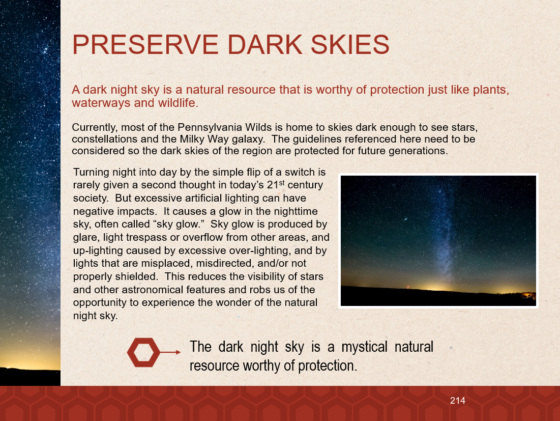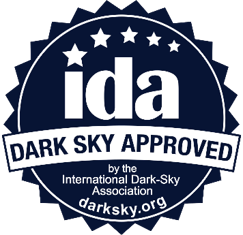A dark night sky is a mystical natural resource that is worthy of protection just like plants, waterways and wildlife.
The Pennsylvania Wilds is world-famous for our dark skies. Seeing the wonders of the night sky is often not possible in more urbanized places where light sources prevent stargazing and other astronomy activities.
Risks of Outdoor Artificial Lighting
Turning night into day by the simple flip of a switch is rarely given a second thought in today’s 21st century society. But excessive artificial lighting can have negative impacts. It causes a glow in the nighttime sky, often called “sky glow.” Sky glow is produced by glare, light trespass or overflow from other areas, and up-lighting caused by excessive over-lighting, and by lights that are misplaced, misdirected, and/or not properly shielded. This reduces the visibility of stars and other astronomical features and robs us of the opportunity to experience the wonder of the natural night sky.
- Excessive artificial light can harm wildlife species, especially nesting birds and animals that move nocturnally.
- It has also been shown to negatively affect natural sleep patterns and increase the risk of cancer, diabetes and cardiovascular heart disease in humans.
- From an energy perspective, too much lighting can be wasteful as lighting is often oversized when installed for many applications. This obviously can be costly to consumers as well as in conflict with the conservation stewardship goals of the PA Wilds initiative
Municipalities need to enact lighting ordinances before they are needed, not when a developer submits a plan to a municipality. Lighting ordinances are involved with the health, safety, and welfare of the public, issues for which municipalities have responsibility.
Stan Stubbe, President of Pennsylvania Outdoor Lighting Council (POLC)

Communities working on preserving dark skies can become an official “Dark Sky Community” – International Dark Sky Association. Visit www.darksky.org for more information.
One of the best sources of information on light pollution and how to address it is the International Dark Sky Association (IDA), founded in 1988. The IDA recognizes that modern society requires outdoor lighting for a variety of needs, including safety and commerce, but advocates that any required lighting be used wisely and should:
- Only be on when needed
- Only light the area that needs it
- Be no brighter than necessary
- Minimize blue light emissions
- Be fully shielded (pointing downward)

Stargaze
The galaxy is just the beginning
One of the best places in the region to practice astronomy and stargazing is Cherry Spring State Park in Potter County. Cherry Springs is the first and only Dark Sky Park in the state. In 2008, the site was designated by the International Dark Sky Association as the second International Dark Sky Park in the world because of its outstanding dark sky resources. An important part of the designation process is a commitment by local communities in helping to protect the resource.
